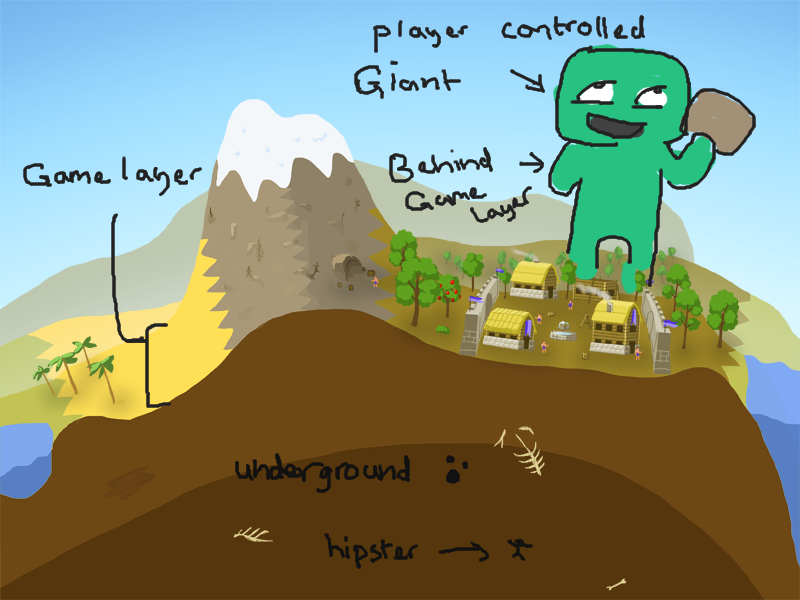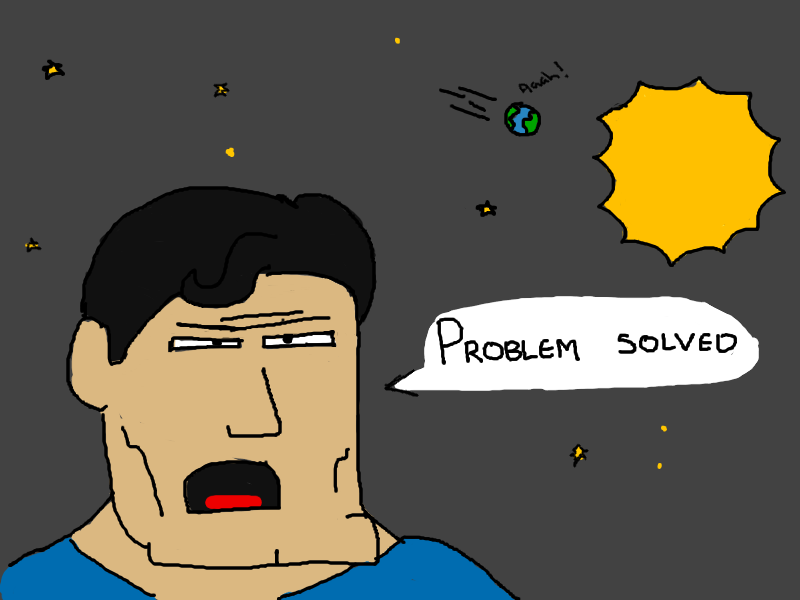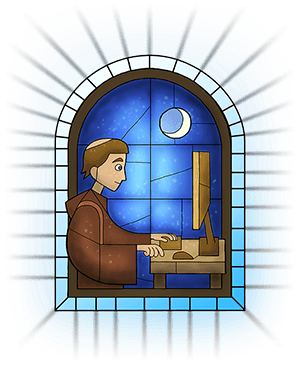Putting god back into god-games
From this post on, I will be revealing features of our new game bit by bit. To keep things interesting for game design purposes, I will also elaborate a bit on that feature. Today we start of with a nearly divine subject! God games!
Reus Features!
You might have noted that we’re making something with a 2D planet and a giant. So alas, we’re not making an realistic FPS. Before we dive into the feeling of the game, let’s look at our inspiration. It’s a beautiful work of art created by Markus Wagner (Music by Matthias Hacksteiner).
In the earliest days of Abbey Games (when we didn’t even use our old name ‘Martian Flytrap’), Bas and I fell in love with this short clip. There were so many things that inspired us. We both loved the art style. I was particularly charmed by the way it represents the current climate issues. Something that really kickstarted the birth of the game was the giant, and how it also represented the world. Wouldn’t it be awesome to control a titan as such, and model the landscapes to your liking? So, that became our first feature:
You control giants that can change the 2D planet.
In the 2D planet you play on the contour of the planet, a bit like this:

Ok, cool! But why are you changing the planet? Well that brings us to feature two:
You bring prosperity to humanity by providing them with resources, and human prosperity advances you through the game.
Makes sense! So there are these little villages with little people-persons living in them. If you give them fruit trees, they grow larger. If you give them gold veins, they’ll grow rich. Give them medicinal herbs and they’ll start advancing technology. But what’s the catch? Where is the challenge or the danger? That brings us to the final feature of today:
Humans grow irresponsible if they grow too fast.
With prosperity comes power. If the humans gain too much power too fast, they don’t know what to do with it and become obsessed with it. Large civilization might start wars to gain more land. Wealthy civilization might become recklessly greedy. Advanced civilization might trigger mishaps with their curiosity. So what do you do when the greedy civilization starts to destroy the adorable balanced civilization, and you have all the powers of nature? THAT’S RIGHT, YOU HURL HURRICANES AND ROCKS AT THEM!! A more subtle way of dealing with these problems is by placing natural danger to temper the growth of civilizations. Just add a bunch of lions to the land, and the greedy civilization will be to busy dealing with lions to start a pillage somewhere else.
For so far the features of today! Now, if you’re interested in game design and want to know about our approach to designing this game, read on!
Superman Complex
A few months ago, Josh Bycer posted this article about god-games and the superman-complex. He states that god-game designers go through the same problems as superman-writers. How can you give a meaningful challenge, if the main-character can pick up the problem and throw it into the sun? If you remember Black & White, you might think of how your power actually gets less throughout the whole campaign. You ended up doing silly things to expand your reach, like throwing rocks for some worshippers. This was for a good reason. Of course the designers want you to feel like a powerful god and destroy things with a snap, but the goal of the game was a power-related one. That is: Destroy the enemy village. If you really are a god, that shouldn’t be a real problem, and the game will run the risk of not being challenging and fun.

If you look at the features of Reus, we try to dodge this problem. In Reus you control giants that influence nature. Your goal is to make humanity prosper with natural resources. You can hurl rocks and hurricanes at the villages that are misbehaving, and you have a vast control over nature. However, any excessive form of power will bring the world out of balance. Give the humans to much, and they will start to behave like spoiled brats. Give them to little (or give them to much hurricane-love), and they will be destroyed, stalling your progress. The idea of Reus is that you have to keep progress in balance, but extreme methods are totally ok if you can perform them correctly. Imagine playing Jenga or another balance game, but significantly more stable. Precise balancing might win the game, but we also want to make sure that the player can just punch the tower and survive if he knows what he’s doing. It might even have its own merits.
Now this surely doesn’t come without its problems. The most difficult problem we’re encountering, is that in terms of gameplay, you have to balance a balance. It’s relatively easy to say:”If you don’t have 300 strength yet, you’re gonna have a bad time against the boss”. We have to make statements like:”If your giants are not strong enough yet, they will bring the village out of balance.” The borders of balance get a lot more vague, On top of that, you also want to give the player more to do once he progresses through the game, implying that the player gains more possibilities and power. Now you’ve got to scale your balance up through the game, adding another balancing dimension. Putting the game back in terms of Jenga, imagine the pieces becoming heavier or longer every few minutes. Keeping the game’s pace and feeling while the balance is shifting is not an easy task.
We’re currently fighting our way through this seemingly uncharted terrain of game design, and we’re sure to find more problems and hick-ups down the road. So if any of you have games that come in mind that we need to play, or if you have done a little research yourself, please post it in the comments! I will try to keep a record of my findings about balance-based design.

blog comments powered by Disqus